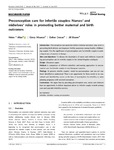Preconception care for infertile couples: Nurses' and midwives' roles in promoting better maternal and birth outcomes.
| dc.contributor.author | Allan, HT | |
| dc.contributor.author | Mounce, G | |
| dc.contributor.author | Crespo, E | |
| dc.contributor.author | SHAWE, JILL | |
| dc.date.accessioned | 2018-08-16T16:03:20Z | |
| dc.date.issued | 2018-12 | |
| dc.identifier.issn | 0962-1067 | |
| dc.identifier.issn | 1365-2702 | |
| dc.identifier.uri | http://hdl.handle.net/10026.1/12163 | |
| dc.description.abstract |
INTRODUCTION: Preconception care promotes better maternal outcomes, may assist in preventing birth defects and improves fertility awareness among healthy childbearing couples. Yet, the significance of preconception care for infertile couples is undeveloped area of practice in Europe. AIMS AND OBJECTIVES: To discuss the importance of nurses and midwives in providing preconception care to infertile couples in the United Kingdom and Spain. DESIGN: Discursive paper. METHOD: A comparison of different midwifery and nursing approaches to preconception care for infertile couples in two European countries. FINDINGS: At present, infertile couples' needs for preconception care are not routinely identified or understood. There is an opportunity for these needs to be considered and identified by nurses at the time of investigation for infertility or when planning pregnancy with assisted conception. CONCLUSIONS: We argue that, by providing preconception care, nurses and midwives have an opportunity to deliver important advice to infertile couples in both primary care and specialist infertility services. | |
| dc.format.extent | 4411-4418 | |
| dc.format.medium | Print-Electronic | |
| dc.language | en | |
| dc.language.iso | en | |
| dc.publisher | Wiley | |
| dc.subject | infertility | |
| dc.subject | midwifery | |
| dc.subject | nursing | |
| dc.subject | preconception | |
| dc.title | Preconception care for infertile couples: Nurses' and midwives' roles in promoting better maternal and birth outcomes. | |
| dc.type | journal-article | |
| dc.type | Journal Article | |
| plymouth.author-url | https://www.ncbi.nlm.nih.gov/pubmed/29943889 | |
| plymouth.issue | 23-24 | |
| plymouth.volume | 27 | |
| plymouth.publication-status | Published | |
| plymouth.journal | Journal of Clinical Nursing | |
| dc.identifier.doi | 10.1111/jocn.14586 | |
| plymouth.organisational-group | /Plymouth | |
| plymouth.organisational-group | /Plymouth/Faculty of Health | |
| plymouth.organisational-group | /Plymouth/Faculty of Health/School of Nursing and Midwifery | |
| plymouth.organisational-group | /Plymouth/REF 2021 Researchers by UoA | |
| plymouth.organisational-group | /Plymouth/REF 2021 Researchers by UoA/UoA03 Allied Health Professions, Dentistry, Nursing and Pharmacy | |
| plymouth.organisational-group | /Plymouth/Research Groups | |
| plymouth.organisational-group | /Plymouth/Research Groups/Institute of Health and Community | |
| plymouth.organisational-group | /Plymouth/Research Groups/Plymouth Institute of Health and Care Research (PIHR) | |
| plymouth.organisational-group | /Plymouth/Users by role | |
| plymouth.organisational-group | /Plymouth/Users by role/Academics | |
| dc.publisher.place | England | |
| dcterms.dateAccepted | 2018-06-16 | |
| dc.rights.embargodate | 2019-6-26 | |
| dc.identifier.eissn | 1365-2702 | |
| dc.rights.embargoperiod | Not known | |
| rioxxterms.versionofrecord | 10.1111/jocn.14586 | |
| rioxxterms.licenseref.uri | http://www.rioxx.net/licenses/all-rights-reserved | |
| rioxxterms.licenseref.startdate | 2018-12 | |
| rioxxterms.type | Journal Article/Review |


